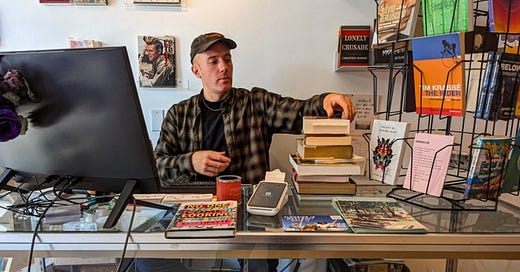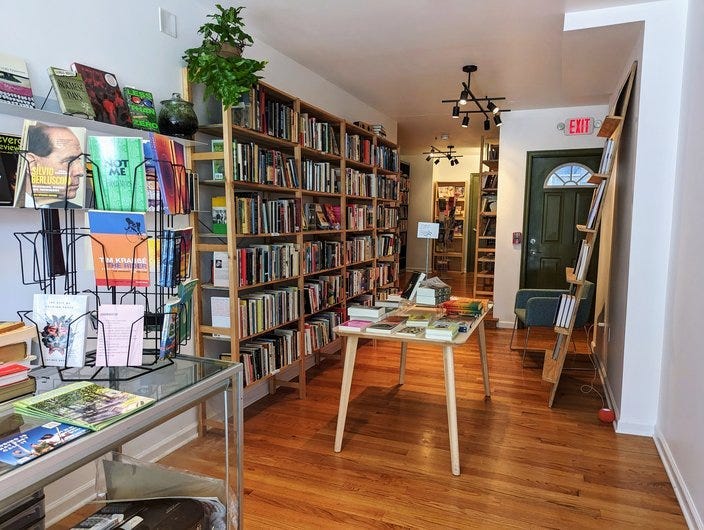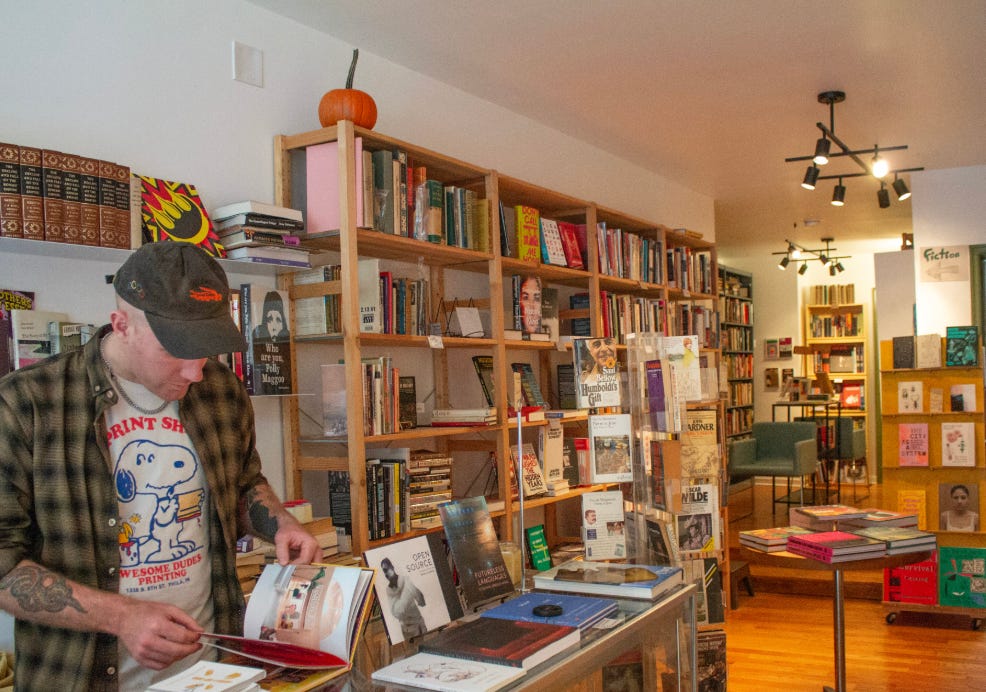An Interview with a Bookseller
A conversation with the owner of one of my favorite local bookstores, Lot 49 Books, in the Fishtown neighborhood of Philadelphia
Bookstores are sacred spaces for me. I have a rule that every time I pass one, I have to go in – especially when exploring a new city. But there’s something so fucking special – magical even, though I sort of hate to trivialize it with that word – about finding YOUR bookstore. The one that feels like it was made with you in mind. Do you know what I mean? Have you found one of these yet?
I don’t know if I could say that I had found my version of this bookstore until I moved to Philly and discovered Lot 49 Books, just a short walk from my house. Lot 49 is a small, independent bookstore that offers new and used books, with everything from fiction to non-fiction, rare books, art books, zines, and even some records nowadays, if I’m not mistaken. They also have workshops, readings, and a host of other literary events that have inspired a community of gritty readers in the Fishtown neighborhood.
Walking into Lot 49, I can always spot titles that are dear to me, some of the best books I’ve read (which I always take as a good omen), and I always leave with a book I’ve never heard of that inevitably blows my mind. It has introduced me to some of my now-favorite, new-to-me authors who are off the beaten path of today’s best sellers. It’s like a portal to all the types of books I want to read, and it consistently exposes me to writing, authors, and literature I’d not previously experienced. I love it so much that I had no choice but to introduce myself to its owner, Drew Waldo, and request an interview for this newsletter.
Thankfully, he was not too creeped out (I don’t think??? 😅) and obliged. I asked him about his motivations for launching the store, how he thinks about curating his shop selection, what his personal reading preferences look like, and how Lot 49 fits into the greater Philly reader community. I hope you enjoy this as much as I enjoyed talking to Drew!
Interview has been edited for length and clarity.
Thanks so much for making the time to do this! I’m just going to jump right in. How did you get into bookselling and ultimately opening a store?
During the pandemic, I was reading a book about Lawrence Ferlinghetti, and he talked about his travels after World War II, and he stumbled upon a small apartment in France that was selling books. That came about at the same time that a friend of mine was looking to rent the downstairs of a shared punk house that he was in. They had always been creative with the space – they've had [music] shows and screenprinting. It clicked in my head, “Oh, I could sell books in this room.” And it went from there. I’ve always loved bookstores. I grew up in suburban Maryland outside DC, and they had a lot of great shops. I just always loved them. I love the “third space” element of a bookshop.
Totally. There’s nothing like the high of browsing a bookstore, for me anyway. So the name Lot 49 is obviously after a book, The Crying of Lot 49 by Thomas Pynchon. What does that book mean to you?
Our original name was after the punk house, which was Disgraceland. It was a little bit too crusty for what I wanted to do. I always liked The Crying of Lot 49. There's a lot of counterculture stuff in that book that resonated with me when I read it as a 20-year-old. There's a paranoid flaneur element to it that I liked, as someone who would go to cities and wander around and pop into bookstores. When I was thinking of names for the shop, it just popped into my head. I had to reread it to make sure it held up.
Had you thought about opening a bookstore before, or was this just a situation where opportunity struck and you were like, “I could make a dream come true here”?
I never thought of it as an adult. I think as a child, I really wanted to own a shop. My thought was, “Oh, this would be great. I'd get to hang out all day.” But as an adult, I didn't think about it. I thought very little about the future in my 20s, and I was 30 when I started doing this. My girlfriend has a small business, which opened my eyes to the idea that I could employ myself.
I get it. So you started selling books out of that space at Disgraceland. What did that look like? What did the initial lift look like to get this off the ground?
It was funny. I ordered a bunch of stuff; I ordered like five copies of around 15 different titles. I ended up having those books for a year or two after. It was a tough learning curve, but I had other booksellers tell me how to find used books. The initial start to the store, I wholesaled a few things, and I accepted trade-ins, so people brought me books, and then I did a few house calls, and it grew from there.
Did you always want to do used books, or were you more interested in getting into new titles from suppliers?
I always wanted to do new and used. I love collecting books and going out and finding stuff. But I also like getting new stuff in, I like seeing what's coming out; I like new hardcovers, so I wanted to do both.
But used books are a lot easier in today's market. They're cheaper, people tend to like them more. There are a lot of people who just wouldn’t spend $18 on a new paperback. I always find myself dialing back the new new stuff. It's difficult.
What is the hardest part about running a bookstore that people might not be aware of?
The hardest part is just how much there is to do. Shelving, sourcing, and communicating with people… we’re trying to grow our online business, and we have a somewhat busy event schedule. Getting into this, I assumed that I would be able to hang out and read a lot more [laughs]. I think people assume that's what the day-to-day is, when really it's a lot of work.
This is your first time running a store, let alone a bookstore. How did you teach yourself all the stuff you mentioned – inventorying, sourcing, and everything it takes to run a successful bookstore?
I’ve consulted local sellers; my partner is probably the biggest resource, to be honest. All bookstores are so different, so while there are some that I feel very akin to, I think most everyone would agree that you create your own path in figuring out what to do. It's been a lot of trial and error, and seeing what sticks. In the past, I've tried to get into new merchandise, like artbooks or cookbooks, and it’s always a tough go– the price point’s a little higher. But as far as successful stuff, we've had some successful poetry workshops.
We’ve had readings at the store, or friends of mine who are writers have taught poetry classes in month-long courses, and we've had some that take off, and the whole class becomes friends for years. That stuff's really, really great. Any event that sparks community among people always feels like a successful experiment.
What are you looking for when you buy books, or when you're sourcing, or when you're thinking about what you want to put on your shelves?
There's stuff I want that's successful, and that isn't to say movie tie-in titles or whatnot – more like having classics that people are always looking for at affordable prices. We also offer sociopolitical works, interesting histories, and some rare books.
With new books, I try to focus on presses that are works in translation or more like on the art-y side, like Semiotext(e), NYRB, and New Directions. I want to meet people where they're at. You don't have to be a Denis Cooper fan to shop here, you don’t have to be looking for the freakiest thing ever.
I'm laughing because I think I bought a Denis Cooper book here. Are the types of books you stock here based on your personal preference, or is that something you identified that could set this bookstore apart?
It's more reflective of how I think of Philadelphia. It’s a poor, big city, and having work that is accessible to people is important. I want to have stuff that's unique and interesting. I like the idea of a bookstore as a place where most people can walk in and find something for themselves.
Do you find it hard, or is it a fun part of your job to keep your finger on the pulse of what's coming out in publishing?
I don't do a good job of this, but I do enjoy it. I've recently started reading print periodicals again: London Review of Books, New York Review of Books, and The New Yorker. I love it, I miss reading long-form journalism and reviews. It's not good professional practice to be getting your news from them, because it's after everything has been published. There are certainly writers who will be hyping stuff that comes out. Social media is a funny one; people will get advanced copies and start posting about them. Stuff like that, I try to keep apprised of. We recently launched a subscription service, so I am trying to be more active in paying attention to what’s on the horizon.
What is the vision for Lot 49? What do the next five years, ten years, whatever, look like? What do you want to do more of, and what do you want to achieve with your store?
I would love to have more new stuff. I'd love to have a little bit more of stuff as it comes out. The rare book section has grown a lot, and I've really enjoyed doing that. I just want to fill the room up. It's just a matter of getting the time and the stock for that. I'd love to be here in ten years on East Girard. We've started to book events at a bar nearby called the Neon Clown Lounge above Kung Fu Necktie. I love doing that and having a presence in the neighborhood and the city. I want to facilitate an active and interesting literary community in Philly.
I live in this neighborhood too, and there are a lot of local businesses, which is awesome. From an outsider's perspective, they all seem to have each other's backs. How do you see Lot 49 as a part of the greater community?
There are a lot of in-person events. I do the Ulises artbook fair every year, and there are other things that I haven't been involved with that I like, like Weirdo Fest.
Fishtown, for a lot of people, is a dining destination or a binge-drinking destination. But for me and shops like Great Circles or like Cloud 9 Clay, you're there for your neighbors. These shops help attract people who want more than just partying – record stores, ceramics, or bookstores, and having all that stuff together helps everybody. It fills out a community.
What do you like to read? What are you reading right now? What are some of your faves?
I've almost finished W. G. Sebald’s The Emigrants. First Sebald that I’ve read. It's fantastic. It's one of those things that you like to hear about for a long time, and being a bookseller, you read the first five pages of a lot of books, and Sebald, for whatever reason, never clicked when I’ve leafed through it. Before this, I read this great book by Walter Kempowski called All for Nothing, which was about Germans fleeing the front lines as Russia invaded in 1945. I’ve been on a German kick. I’ve gravitated towards grit lit, like Dennis Johnson and Raymond Carver. I recently read Harry Crews for the first time. Gary Indiana always has some of that gritty, true crime element to his writing.
Who is your Mount Rushmore of authors?
Oh, man, I was worried you would ask me. William T. Vollmann always resonated with me; Thomas Pynchon obviously, and I like that they might not like each other. Dennis Johnson… I’d probably put Joyce Williams up there. I’ve started to enjoy her writing. I’ll put John McPhee on my Mount Rushmore as well. He’s a nonfiction writer for the New Yorker. I think it would be funny to have five stone heads and four of them are weird and gnarly ones, and then a nonfiction writer. McPhee wrote an entire book about a single tennis match, he wrote this fantastic book on the Pine Barrens; he gets really into geology later in his career. He’s a fun read.
What are some of your go-to book recommendations?
I've been recommending the Cookie Mueller collection, Walking Through Clear Water in a Pool Painted Black. I like texts that I can recommend to people that are trying to find something to read, which I know sounds stupid, but I there's so many people that I'll talk to that are like, “Oh, I don't read anything, I can't read anything, I have no attention span.” I find Mueller’s writing to be fun. Her life was crazy, she was in all these compelling circles, and her work is very digestible; it’s something that a lot of people can take something from. She was a writer who wasn’t afraid to play with form and do interesting things. Hanuman came out with Fan Mail, Frank Letters, and Crank Calls, which was a novel she wrote through voice mail and letters. That's something I sell a surprising amount of. I also sold a lot of Someone Who Isn’t Me by Geoff Rickly. He took a psychedelic in Mexico to get off heroin, and the novel, which is pretty much autobiographical, follows his experience doing that; it's great.
One of the things I enjoy about the bookstore is you get to recommend things to people; you start talking about books, and it's like, not everyone has read Jesus’ Son by Dennis Johnson, or not everyone has stumbled upon Denis Cooper in a library, and that's been rewarding. It's the opposite of online culture, where, because of how people interact online, you're supposed to know everything. It almost makes it difficult to be outwardly enthusiastic about stuff you might love. And so it's a real blessing to be able to say to someone in person, “Jesus’ Son is a really great book, you should read it,” and then they come back and they're like, “That was crazy!”
Totally! I always wanted to talk to booksellers because I'm like, you obviously know some shit. But what I love about coming to Lot 49 is that I can always bring you something from the shelves and be like, “Have you read this? What do you know about this?” And you have read half of what I bring to you, or you’re like, “I haven't read this, but I read about something related to it from somebody else.” Even if you can’t recommend it from your own reading experience, there's a thread or connection there that inspires me to look into another author or brings my attention to another title. It makes a very cool network of how I’m finding new things to read that isn’t just picking up a shiny new hardcover at Barnes & Noble, and hopefully it’s good cause it's out front. It’s a more real connection, it's a more useful connection. It's getting me more of what I want from books, which is nice.
That's a great compliment. Thanks. Books are the conversation, and I feel like they're in conversation with so many different things. It's really fun, and with anything like bookselling or physical media, you have to be able to say why you like something or what the value is, and the conversation, the storytelling behind it, is the way to do that.
Thank you SO so much to Drew Waldo for taking the time. Get more of Lot 49 online at their website, or sign up for their Lot of the Month subscription service! You can also follow them on IG here, and stay apprised of their upcoming events here. I hope you get the chance to check them out in person.
✨Heads up fam! I’m using my Bookshop affiliate link for all titles recommended in this newsletter. If you buy them through these links, I earn a commission! So help a girl out!✨
📖 Currently reading:
A Leopard-Skin Hat by Anne Serre.
📚Recently finished:
The Factory by Hiroko Oyamada. Another weird-ass Oyamada joint. Kind of reminded me of Severance. A fun read.
The Killjoy by Anne Fine. LOVED this. Truly harrowing. Character development is off the charts.
💌 Email me book recs and other literary thoughts at emilygatesjohnson@gmail.com
🛍 Shop all Point of Departure recs (and more!) from my digital bookstore here.











loveeee this interview! it’s such a special space, thank you for bringing me there when i visited philly 🥹🥹
I loved reading this so much and thank you for putting Lot 49 on my radar. I love the Philadelphia art scene (my husband went to gradschool at Villanova and we both just love the city for art and music... all in that distinct Philly raw, no-nonsense kind of way). It feels like this bookstore really capture that spirit.
Do more bookseller interviews please! I know we are all secretly dreaming of owning our own bookstores some day!